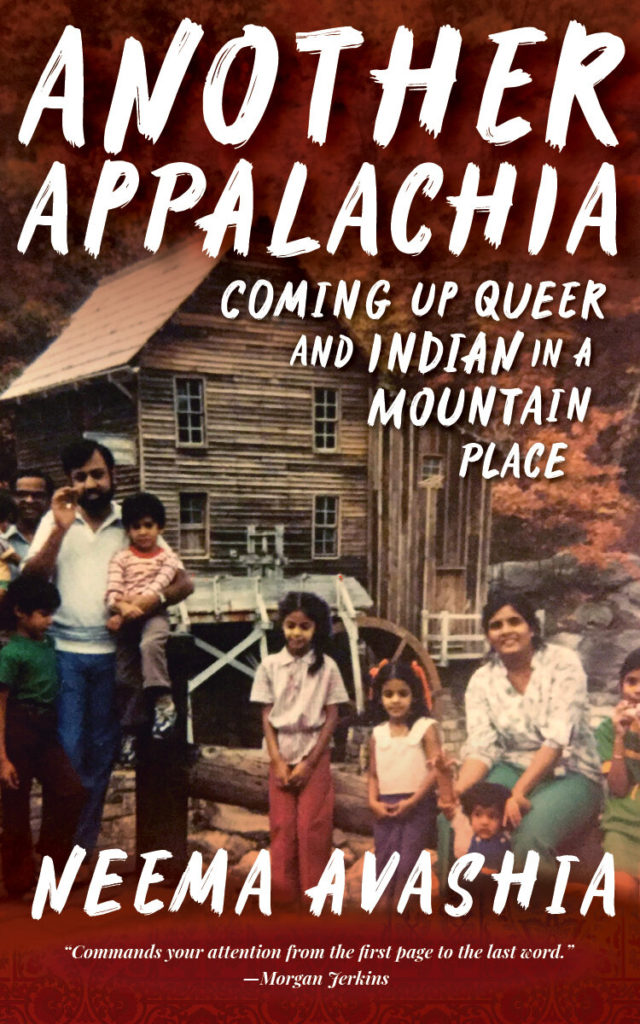Another Appalachia: An Interview with Neema Avashia
By ERIKA KITZMILLER

When Neema Avashia tells people where she’s from, their response is nearly always a disbelieving, “There are Indian people in West Virginia?” A queer Asian American teacher and writer, Avashia fits few Appalachian stereotypes. But the lessons she learned in childhood about race and class, gender and sexuality, continue to inform the way she moves through the world today: how she loves, how she teaches, how she advocates, how she struggles.
Another Appalachia examines both the roots and the resonance of Avashia’s identity as a queer, desi, Appalachian woman, while encouraging readers to envision more complex versions of both Appalachia and the nation as a whole. With lyric and narrative explorations of foodways, religion, sports, standards of beauty, social media, gun culture, and more, Another Appalachia mixes nostalgia and humor, sadness and sweetness, personal reflection and universal questions.
In this interview, we asked Avashia to discuss why she wrote the book, what she hopes people learn, and her own ideas about life in Appalachia.
What inspired you to write this book?
After I left Appalachia, most people acted shocked when they learned that I was born and raised in WV. And for a long time, I just wrote off their shock as ignorance. But when Hillbilly Elegy was published, and so many people started to hold it up as a definitive explainer for the people and culture of Appalachia, I was reminded that ignorance can be incredibly harmful. That when a region gets painted with a broad brush, and its people are flattened into stereotypes, it becomes easier for folks outside the region to support policies that further dehumanize them. So I wanted to write my story–of growing up queer and Indian in Appalachia–as a way to disrupt the mainstream narrative about the place that I’m from.
Can you tell me about the book? What do you hope your readers take away or learn from the book?
The book is a collection of essays that span a large portion of my life–from growing up in Appalachia to living in Boston today. In the essays, I explore the ways in which Appalachia shaped my identity growing up, and continues to shape how I move through the world today. I have two objectives for my readers, depending on who those readers are: To force outsiders to view Appalachia with more compassion and nuance. And to offer a mirror to young people in Appalachia–queer kids, immigrant kids, BIPOC kids–where one didn’t really exist before.
What did you learn when writing the book?
I learned that in order to put essays down on the page, there is a LOT of mental and emotional work that has to happen in my mind first. You can’t rush an essay–sometimes you have to live longer, and sit with the questions longer, in order for the essay to get to a place where it is ready for readers.
What surprised you as you wrote this book?
I was surprised by how much the essays in this book were resonating for people when they got published. I think even as I was writing, I thought I was an exception, and that my experience was so anomalous that people wouldn’t be able to relate to it. And the exact opposite happened–people who had nothing in common with me were still finding themselves in the book.
How did you pick the title? What does the title mean?
I chose the title “Another Appalachia” to push back against the notion of Appalachia as homogenous. I wanted a reader, even if they didn’t get past the cover, to understand that Appalachia is not just one thing. And that Appalachians are not just one kind of people. So “another” pushes people to recognize that Appalachia is full of anothers.
What misconceptions about Appalachia, if any, does your book address? What do you hope people from the area learn from your work? What do you hope outsiders learn from your work?
As I’ve mentioned, I think there’s a misconception that Appalachia is a homogenous place: White, straight, and Christian. My book pushes back on that, and asks people to see that Appalachia is and has been home to immigrants, to Black folks, to queer folks, for generations. I hope that people from Appalachia see an appreciation for our home and all that is good about it reflected back to them in the book. And I hope outsiders learn that there’s much they could learn from people in Appalachia, from how care looks, from how community works, and apply to their own way of living.
What is about Appalachia that makes you proud? Or that motivated you to write about it?
So much makes me proud. I am proud of how much resilience Appalachian folks show in the face of policies and politicians that fail them repeatedly. I am proud of queer and BIPOC folks in Appalachia fighting to make it a place that is welcoming to everyone. I’m proud of how Appalachian people care for one another, and how they fill in gaps for one another, in a context where it seems more and more clear that all we’ve got is us.
